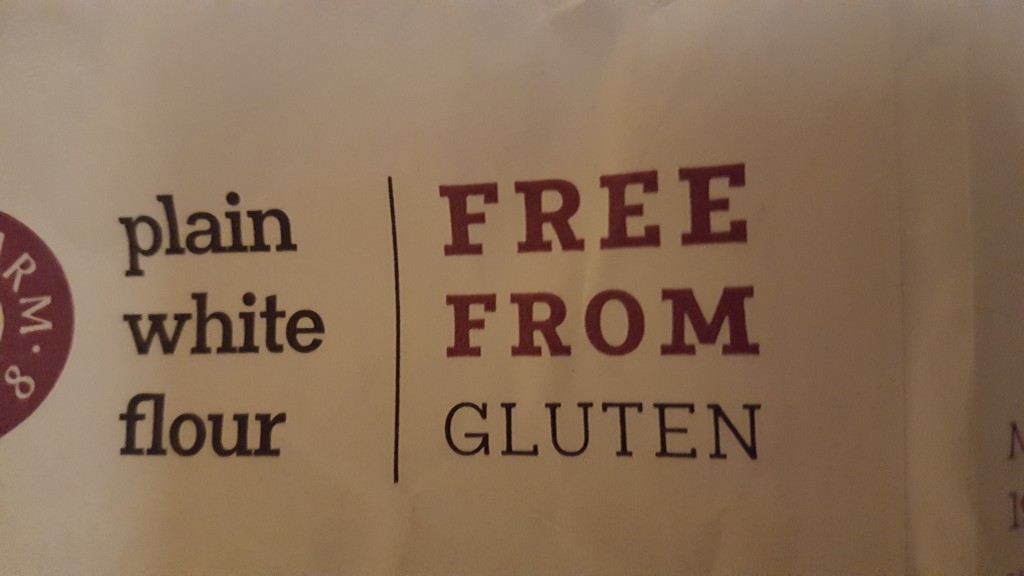TV doctor and coeliac sufferer Chris Steele is urging people to take notice of their symptoms if they suffer from digestive issues or other potential symptoms of coeliac disease, with experts believing hundreds of thousands of people in the UK could unknowingly be suffering from Coeliac disease.

Celiac Awareness
This week is Coeliac UK Awareness Week and, according to Coeliac UK, the national charity for people with coeliac disease, around 1 in 100 people in the UK are estimated to suffer from the condition. However under-diagnosis is a big problem with an estimated 500,000 people in the UK suffering from the condition without knowing. It takes on average 13 years from the onset of symptoms for people to achieve a diagnosis. One in four people diagnosed with coeliac disease were previously treated for IBS.
Coeliac disease is an autoimmune condition where a person has an adverse reaction to gluten, a protein found in wheat, barley and rye. There are a range of symptoms, including digestive problems such as abdominal bloating, pain, gas, regular bouts of diarrhoea and weight loss as well as ongoing fatigue, a severe blister like skin rash, and iron deficiency anaemia.
New research shows that almost 40% of people in the UK suffer from digestive issues, however, almost half have never been diagnosed.
Of those that have been diagnosed, more than a quarter weren’t diagnosed for over a year, and above 40% said they thought the symptoms would go away gradually. Surprisingly one in eight were misdiagnosed by a GP, while the same number were embarrassed to talk about their symptoms.
Although there has been more attention around gluten and gluten free products in recent years there seems to be confusion over what products actually contain gluten. A quarter of those surveyed did not know that bread contains gluten, a third were unaware it was in pasta and almost two thirds did not realise beer contains gluten, while one in eight believe oats should be avoided at all costs by people with coeliac disease. In fact, according to Coeliac UK, 95% of suffers are able to tolerate oats as long as they are labelled as gluten free. The British Society of Gastroenterology Guidelines for the diagnosis and management of coeliac disease advice that gluten-free oats can be included within the diet from diagnosis.
Once following a gluten free diet, it is important to ensure you are not missing out on key nutrients such as fibre. Following recent changes to guidance from the British Society of Gastroenterology, gluten free oats are now listed as a safe food for people with coeliac disease to consume from diagnosis, providing an important source of fibre in gluten free diets.
PatientTalk.Org were lucky enough to interview Dr Chris to give us a great introduction to Celiac.
Patient Talk: Its coeliac awareness week, and joining me now is Dr. Chris Steele to tell us a bit more about it. Dr Chris, first of all what is coeliac disease
Dr Chris: Well, Coeliac disease is a serious illness, it’s a life long illness, and basically it’s a reaction to the body from a protein called gluten, and gluten is found in wheat, barley and rye. And these grains are found lots of food. Basically these- the gluten causes the immune system to overreact and your immune system starts attacking your own tissues, so in effect it’s what’s known as an autoimmune disease and not actually an allergy to gluten. The gluten has caused your immune system to attack your own tissues.
Patient Talk: And how common is it?
Dr .Chris: well it’s actually not uncommon, 1 in 100 people have coeliac disease. But what disturbs me is that they are half a million people out there walking around with coeliac disease and they don’t know they got, they’re not diagnosed.
Patient Talk: They are just experiencing the symptoms and not knowing what to do.
Dr Chris.: Yeah – They may just be experiencing mild symptoms, or symptoms that come and go. And the symptoms they can’t put down to any one thing in particular. Whereas the reactant to gluten – but it could be in all sorts of different foods that they are eating. You know- If you’re just reacting to eggs you will soon find out when you are reacting to many different food that contain gluten it’s very hard to find out, there is a specific trigger for your symptoms.
Patient Talk: And what are these primary symptoms?
Dr. Chris: Now the symptoms are very important because some patients will have and these symptoms may be diagnosed as having another conditions like irritable bowel syndrome, IBS. So the sort of classic common symptoms of coeliac disease – and I know ‘cause I have coeliac disease and I’ve been through this in the early days: Diarrhoea. That can come in episodes depending on when you have been exposed to the gluten, the urgency to go, when you got to go you got to go, otherwise there will be an accident. Abdominal bloating, abdominal discomfort and fatigue, weakness. They’re the classic ones, you can get other symptoms such as mouth ulcers, hair loss, aching joints and bones. The consequences of not being diagnosed. So, here you are walking round with IBS and you really have coeliac, and you’re not absorbing certain nutrients – such as – for myself it was vitamin D and calcium, so I got oscosteoporosis, as a consequence for having undiagnosed coeliac disease for many years. Anaemia an unknown cause can be caused by coeliac disease. One interesting area, it’s not a massive area, but women for having recurrent miscarriages or problems with infertility should be tested for coeliac disease.
Patient Talk: What are the tests for it?
Dr. Chris: Tests – simple, single blood test, that’s all there is to it. Now if you have these symptoms and are thinking “Oh that could be me” go and see you GP for a blood test and do not change your diet, if you stop eating gluten your tests could come back negative. So eat normally have your blood tests and if that’s positive then you’ll be referred to a specialist for a biopsy test, it’s only a thin flexible test going down and then again before that test do not change your diet, have normally food before those tests have been done.
Patient Talk: Are there other types of gluten intolerance?
Dr. Chris: Well it’s a complicated area and it’s probably best not to go into that because you can have non-coeliac gluten intolerance, you can be intolerant to other proteins similar to gluten….it’s quite a complicated area. For most patients they have coeliac disease caused by gluten, therefore avoid gluten in the future.
Patient Talk: Okay. So, let’s talk about treatments available, what are they and how efficient are they?
Dr. Chris: Well, there is no cure for coeliac disease and there is no treatment. That sounds very negative. However the answer is going on to a strict gluten free diet for life. It’s as simple as that, but following and gluten free diet is not simple. It’s very difficult and adjust to and you need to see a nutritious after you’ve seen your specialist to get advice on gluten free food. You will become an expert on reading labels to check whether there is gluten in there or not.
Patient Talk: Can you tell us a bit about this research what you’ve done, a bit about methodology and what the results were.
Dr. Chris: Well the latest research has come out has actually changed the way we manage coeliac disease. Usually the patient has been diagnosed as a coeliac sufferer and told: right avoid wheat, barley and rye and don’t eat oats. Oats don’t contain gluten. But don’t eat oats for 6 to 12 months and then slowly introduce them into your diet. Now the latest research has changed all of that completely, once you’re diagnosed you can’t eat wheat, barely or rye but you can eat oats there on then. But of course when you are buying oat products got to assure that they are gluten free
Patient Talk: Read the label.
Dr. Chris: Yes, read the label – they have got to be gluten free. Although oats don’t contain gluten they can be contaminated by gluten up by the farm, if oats are mixed with wheat barley, rye the farming process, in the mill where the grains are milled if the oats can be contaminated by wheat barely rye. And also in the bakery, that makes the cakes, pastries and the crackers, has to be a dedicated bakery where there are no grains where there are wheat barely or rye.
Patient Talk: Finally for this part what is the best advice which you have about coeliac disease?
Dr. Chris: You can’t treat coeliac disease, that you have to avoid gluten and also because you aren’t eating grains like wheat barley and rye, you’ve got to eat oats you’ve got to get those grains into your diet they have to be gluten free. The reason for that is oats are a good source of fibre, fibre reduces cholesterol fibre fills you for longer, provides slow release energy for longer, and also is very good for bowel health. So coeliacs’ have got to get oats into their diets. Now, I’ve looked at all of these products out there, and there is a company called Nairn’s, who are dedicated in producing only gluten free oat products: Biscuits, crackers etc… and they are probably one of the biggest suppliers out there on supermarket shelves, and I can say I use their products I’ve tested them all.
Keep your eyes peeled for our follow up article on advice for the just diagnosed!



